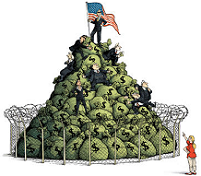Neither freedom nor free enterprise mean abusing the ability to crush the competition through dumping and the hoarding of resources
These days we are facing the unfortunate picture of the proliferation of oligopolies that gradually crush small and medium-sized enterprises, centralizing economic power in a few large conglomerates who develop a growing political power to consolidate their hegemony over the markets. This process eventually lead to a corrupt political and economic environment and to the dismantling of a true democracy. The Economist proposes to corectly "make life easier for startups and small firms", to avoid higher taxes and protectionism and to deal with olygopolies and monopolies by "modernising the antitrust apparatus". US voters should take into account these basic policies when revising the candidates platforms.
Big firms in the United States have never had it so good. It's time for more competition

March 26.─ America used to be the land of opportunity and optimism. Now opportunity is seen as the preserve of the elite: two-thirds of Americans believe the economy is rigged in favour of vested interests. And optimism has turned to anger. Voters’ fury fuels the insurgencies of Donald Trump and Bernie Sanders and weakens insiders like Hillary Clinton.
The campaigns have found plenty of things to blame, from free-trade deals to the recklessness of Wall Street. But one problem with American capitalism has been overlooked: a corrosive lack of competition.
The naughty secret of American firms is that life at home is much easier: their returns on equity are 40% higher in the United States than they are abroad. Aggregate domestic profits are at near-record levels relative to GDP. America is meant to be a temple of free enterprise. It isn’t.
Borne by the USA
High profits might be a sign of brilliant innovations or wise long-term investments, were it not for the fact that they are also suspiciously persistent. A very profitable American firm has an 80% chance of being that way ten years later. In the 1990s the odds were only about 50%. Some companies are capable of sustained excellence, but most would expect to see their profits competed away. Today, incumbents find it easier to make hay for longer (see Briefing).
You might think that voters would be happy that their employers are thriving. But if they are not reinvested, or spent by shareholders, high profits can dampen demand. The excess cash generated domestically by American firms beyond their investment budgets is running at $800 billion a year, or 4% of GDP. The tax system encourages them to park foreign profits abroad. Abnormally high profits can worsen inequality if they are the result of persistently high prices or depressed wages. Were America’s firms to cut prices so that their profits were at historically normal levels, consumers’ bills might be 2% lower. If steep earnings are not luring in new entrants, that may mean that firms are abusing monopoly positions, or using lobbying to stifle competition. The game may indeed be rigged ...
[ Full text ]
Comments powered by CComment